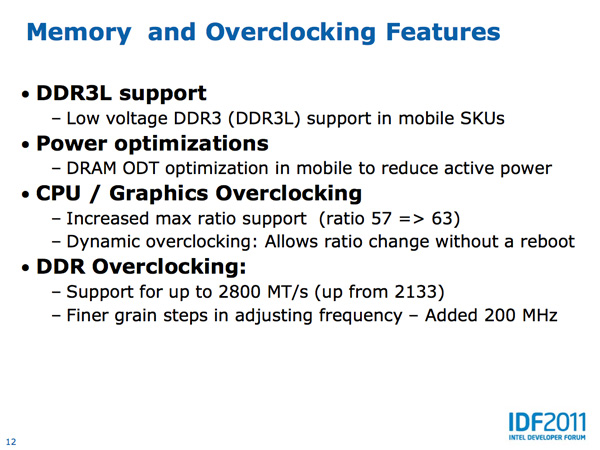Intel's Ivy Bridge Architecture Exposed
by Anand Lal Shimpi on September 17, 2011 2:00 AM EST- Posted in
- CPUs
- Intel
- Ivy Bridge
- IDF 2011
- Trade Shows
Cache, Memory Controller & Overclocking Changes
Despite the title of this section, to my knowledge there haven't been any changes to Ivy Bridge's cache. The last level cache (L3) is still shared via a ring bus between all cores, the GPU and the system agent. Quad-core Ivy Bridge CPUs will support up to 8MB of L3 cache, and the private L1/L2s haven't increased from their sizes in Sandy Bridge (32+32K/256K).
The memory controller also remains relatively unchanged, aside from some additional flexibility. Mobile IVB supports DDR3L in addition to DDR3, enabling 1.35V memory instead of the standard 1.5V DDR3. This is particularly useful in notebooks that have on-board DDR3 on the underside of the notebook; OEMs can use DDR3L and keep your lap a bit cooler.

From Nehalem to Sandy Bridge, Intel introduced fairly healthy amounts of power gating throughout the processor. With little more to address in Ivy Bridge, Intel power gated one of the last available portions of the die: the DDR3 interface. If there's no external memory activity, the DDR3 interface can now be turned off completely. External IOs leak current like any other transistor so this change makes sense. Power gating simply increases die size but at 22nm Intel should have some extra area to spend on things like this.
Memory overclocking also gets a bump in Ivy Bridge. The max supported DDR3 frequency in SNB was 2133MHz, Ivy Bridge moves this up to 2800MHz. You can now also increase memory frequency in 200MHz increments.










97 Comments
View All Comments
medi01 - Sunday, September 18, 2011 - link
It's been a while that most users didn't really need faster CPUs or GPUs.In a couple of years, why on earth would anyone but gamers need a PC? Emails, browsing, video would be covered by tablets and the likes.
dealcorn - Friday, November 4, 2011 - link
My Suzuki Alto has about the horsepower of a team of mules and it's fine, really. However, if for about the same money and fuel economy I could get 600 hp, darn right I need 600 hp. That's about where we are at with CPU power. I believe your issue is more properly stated as "there is a need to re engineer humanity because it is not doing what I want."Billy_Boy - Saturday, September 17, 2011 - link
"In Sandy Bridge, many of those structures are statically partitioned. If you have a buffer that can hold 20 entries, each thread gets up to 10 entries in the buffer. In the event of a single threaded workload, half of the buffer goes unused."If you turn off HT does this go away in Sandy Bridge?
BioTurboNick - Saturday, September 17, 2011 - link
They are talking about a hardware implementation, so it wouldn't go away by disabling hyper-threading.Zoomer - Saturday, September 17, 2011 - link
It depends if the designers thought it would be important enough to implement. Losing 1/2 of the many resources (though probably not execution resources) is huge, and on a non-HT chip it's almost like castrating it.BioTurboNick - Saturday, September 17, 2011 - link
Right. That's probably why Ivy Bridge is moving to completely single-thread-capable resources.danjw - Saturday, September 17, 2011 - link
I am wondering if Ivy Bridge will be faster for gaming then the Sandy Bridge-E. I lot of the improvements seem to be with threading, but more games are starting to implement threading. Sandy Bridge-E will have PCI-Express 3.0 and more memory channels, but Ivy Bridge will have faster memory.Hrel - Saturday, September 17, 2011 - link
Will Intel FINALLY be turning on hyper threading on every CPU? Cause if not that's the final straw that breaks the camels back, I'm going AMD. It took them years to finally get a decent quad core down to 200 bucks, but then if you wanted HT it cost another 100 bucks. Ridiculous. I want to be able to buy a K series quad core with HT for under 200 bucks. Also WHY are there USB 2.0 ports on this AT ALL?If AMD has all usb 3.0 ports and the CPU performance is comparable I'm def switching camps.
Do you guys know if AMD has any plans on releasing SSD caching on their motherboards too? Cause that really is a "killer app" so to speak. Large SSD's are too expensive to make any sense unless you're filthy rich but 64GB with two 2TB HDD's in RAID sounds pretty great.
philosofool - Saturday, September 17, 2011 - link
When AMD releases serious competitors at the relevant price points. I hope bulldozer kicks ass, because a solid quad core will be two hundred bucks until there is real competition.medi01 - Sunday, September 18, 2011 - link
If you count motherboard price in, AMD is already more than competitive.